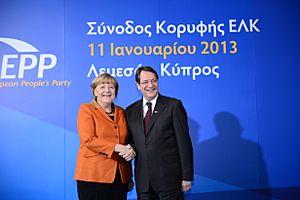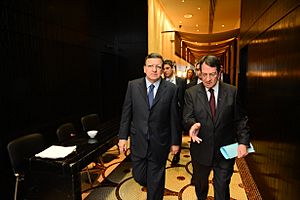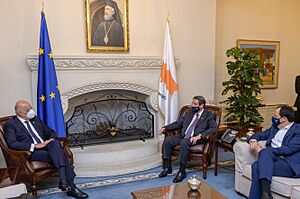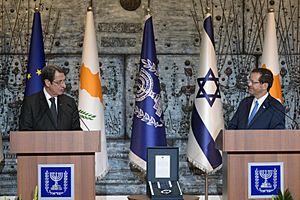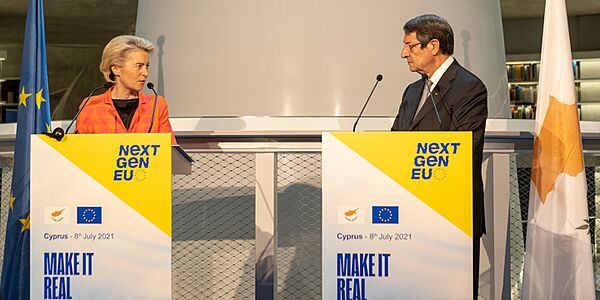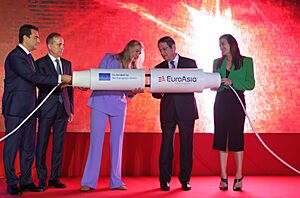Nicos Anastasiades facts for kids
Quick facts for kids
Nicos Anastasiades
|
|
|---|---|
| Νίκος Αναστασιάδης | |
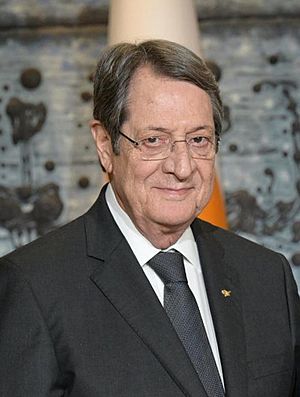
Anastasiades in 2022
|
|
| 7th President of Cyprus | |
| In office 28 February 2013 – 28 February 2023 |
|
| Preceded by | Demetris Christofias |
| Succeeded by | Nikos Christodoulides |
| President of the Democratic Rally | |
| In office 8 June 1997 – 10 May 2013 |
|
| Preceded by | Yiannakis Matsis |
| Succeeded by | Averof Neofytou |
| Member of the Cypriot House of Representatives | |
| In office 4 June 1981 – 27 February 2013 |
|
| Constituency | Limassol |
| Personal details | |
| Born | 27 September 1946 Pera Pedi, Limassol District, British Cyprus (now Cyprus) |
| Political party | Democratic Rally (1976–present) Centre Union (before 1977) |
| Spouse |
Andri Moustakoudes
(m. 1971) |
| Children | 2 |
| Alma mater | University of Athens University of London |
| Signature |  |
Nicos Anastasiades (Greek: Νίκος Αναστασιάδης; born 27 September 1946) is a Cypriot politician and businessperson. He served as the seventh president of Cyprus from 2013 to 2023. Before becoming president, he led the Democratic Rally party from 1997 to 2013. He was also a Member of Parliament for Limassol from 1981 to 2013.
Anastasiades became president in 2013 during a difficult economic time for Cyprus. He worked with international groups to get a financial rescue package. This meant making some tough choices, like cutting public spending. However, his government also brought in new investments and later increased the minimum wage, which helped the economy get better. He was re-elected in 2018.
During his time as president, Anastasiades tried to bring about the biggest talks for the unification of Cyprus since 2004. However, these talks did not lead to an agreement. He also had a long-standing relationship with Russia, partly because his law firm worked with Russian clients. He signed agreements to improve economic ties with Russia. Later, he changed these policies after the Russian invasion of Ukraine.
Contents
Early Life and Education
Nicos Anastasiades was born in the village of Pera Pedi on 27 September 1946. He studied law at the National and Kapodistrian University of Athens. He then did more studies in shipping law at the University of London.
Law Career
Anastasiades is a lawyer. He started his own law firm called "Nicos Chr. Anastasiades & Partners." This firm offered services to clients, including many from Russia. After he became president, he left the firm to be managed by his two daughters and other partners. The law firm has stated that it did nothing wrong. Anastasiades has also said he has not been actively involved in the firm since 1997.
Early Political Career
Anastasiades was first elected to the House of Representatives in 1981. He was a Member of Parliament until 2013, when he became President of Cyprus. He was the leader of his party, the Democratic Rally, from 1997 to 2013.
Presidency
Presidential Elections
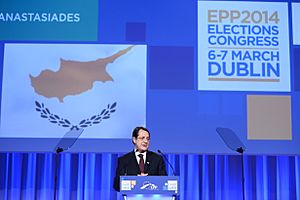
In March 2012, Nicos Anastasiades was chosen as a candidate for the 2013 Cypriot presidential election. He won the party vote with 86.73%. In the first round of the election in February 2013, he received 45% of the votes. He then won the second round with 57.48% of the vote and became president on 28 February 2013.
He won again in the 2018 Cypriot presidential election, beating the same opponent as in 2013.
Economy
Helping the Banks
When Anastasiades became president in 2013, Cyprus was facing a big economic crisis. The country's banks were in trouble.
He worked with the European Union and the International Monetary Fund to get a financial rescue package. This deal helped stop the main banks in Cyprus from going bankrupt. The agreement meant that some large bank accounts had to contribute to the bailout. Anastasiades said this was a very difficult decision, but it was necessary to save Cyprus from an even worse situation.
Despite the challenges, the government's actions helped the banking system recover. Cyprus was able to finish the bailout program in 2016. The economy grew well from 2018 to 2022, and the country paid off its debt to the IMF earlier than planned.
Closing Cyprus Popular Bank
As part of the bailout plan, Cyprus Popular Bank, which was the second-largest bank in Cyprus, had to close. Deposits under 100,000 euros were moved to another bank, while other parts of the bank were closed down. This led to losses for some investors. The remaining parts of Cyprus Popular Bank were then combined with Bank of Cyprus, the largest bank.
Cyprus Popular Bank had faced big financial problems for several years. Its closure was a sad moment for Cyprus's economy and affected many bank employees.
Closing Cyprus Airways
On 9 January 2015, Cyprus Airways, the national airline that had been flying for 67 years, suddenly closed. This happened after the European Commission ruled that money the airline received from the government was illegal state aid. President Anastasiades expressed his regret about the closure. He promised to help the 560 employees who lost their jobs and supported the creation of a new airline.
In July 2016, Anastasiades' government announced that a new company, Charlie Airlines Ltd, could use the Cyprus Airways brand. This move aimed to bring back the historic airline. Today, the new Cyprus Airways flies to many airports, helping to connect Cyprus with the rest of the world.
Closing Cyprus Cooperative Bank
Nicos Anastasiades also faced criticism regarding the closure of the Cyprus Cooperative Bank (CCB). The bank had financial problems starting in 2013, with many loans that were not being paid back. Even after receiving money from the government in 2014 and 2015, the bank remained in trouble. In 2018, the European Central Bank decided that CCB had to close. Its good parts were sold to Hellenic Bank, and the bad loans were moved to a new company.
Investigations looked into the roles of President Anastasiades and the Finance Minister at the time. The report said there were delays and problems in trying to save the bank. The closure of CCB showed the challenges from poor management and many unpaid loans.
Introducing Minimum Wage
President Anastasiades made a big change in Cyprus by introducing a minimum wage. Before this, there was no set minimum wage in the country. The decision was made in July 2022 after meetings with workers' unions and employer groups.
The new minimum wage came into effect on 1 January 2023. It set a monthly minimum of €940 (before taxes) for full-time work. This change helped about 40,000 workers who earned low wages.
Public Spending
Anastasiades promised to make changes to get economic help. This meant cutting some social benefits, pensions, and wages in both public and private jobs. He also increased taxes on things like VAT and fuel. He also decided to reduce the number of people working for the government.
Changing the Military Service

During his election campaign in 2013, Anastasiades promised to reduce the time people had to serve in the military in Cyprus. This was meant to encourage more young people to join and to save money for the country.
In August 2013, the Minister of Defence announced that military service would be reduced. By February 2016, it was decided to reduce the service to 18 months for some and 14 months for others. To help the Cypriot National Guard with these changes, President Anastasiades introduced "contracted soldiers." These soldiers help cover the needs of the National Guard now that the service time is shorter.
The Cyprus Problem
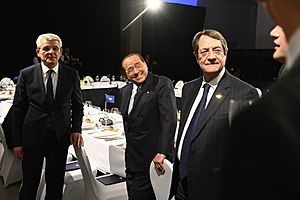

Anastasiades supported a plan to reunite Cyprus, even though most of his party did not. Peace talks between Anastasiades and the Turkish Cypriot leader began in October 2013. These talks attracted attention from international media and world leaders.
Mont Pèlerin Talks
In November 2016, Anastasiades and Turkish Cypriot leader Mustafa Akıncı held talks in Switzerland to find a solution for the Cyprus problem. These talks were supported by the United Nations. There was some progress, especially on land issues. However, the talks ended because they could not agree on how much land each side would control. Anastasiades faced some criticism for pausing the talks to return to Cyprus for discussions.
Crans-Montana Talks

The Crans-Montana talks took place in Switzerland in the summer of 2017. Anastasiades and Mustafa Akıncı, along with representatives from Greece, Turkey, the U.K., the UN, and the EU, discussed reuniting Cyprus. Many people were hopeful that these talks would solve the long-standing dispute.
However, the talks faced a big problem. A proposal from UN Secretary-General António Guterres was discussed. There was disagreement about the notes from a key meeting, which Anastasiades said were crucial. This disagreement over the meeting notes contributed to the talks breaking down.
The Guterres Framework included important ideas about political equality, land adjustments, property rights, and security. It suggested a rotating presidency and changes to territory. It also looked at free movement of goods and people. The security part aimed to replace old intervention rights with new monitoring systems.
Later Developments
In October 2022, Anastasiades criticized the European Union for being too "tolerant" towards Turkey. He argued that principles should come before interests. He compared it to the support given to Ukraine against invasion, saying the same principles should apply to Cyprus.
Foreign Policy
Cooperation with Egypt and Greece
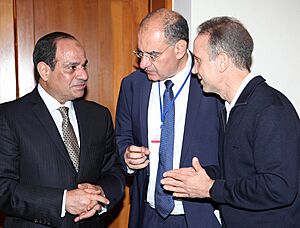
On 8 November 2014, Anastasiades met with the President of Egypt, Abdel Fattah el-Sisi, and the Prime Minister of Greece, Antonis Samaras, in Cairo. This was the first meeting of its kind between the three countries. They agreed to work together to promote peace and stability in their region. These three-way meetings became a regular event during Anastasiades' presidency.
Cooperation with Israel and Greece


|
President of the European Commission Ursula von der Leyen at the University of Cyprus on 8 July 2021, announces approval and funding of €100 million for EuroAsia Interconnector out of the Cyprus RRP programme.
|
The first meeting between Cyprus, Israel, and Greece took place on 28 January 2016, in Nicosia. They signed an agreement to work together in many areas. The United States also joined one of these later meetings.
On 2 January 2020, Anastasiades’ government signed a deal with Greece and Israel to build a long undersea pipeline called the EastMed pipeline. This pipeline was meant to carry natural gas from the Eastern Mediterranean to Europe. However, the project was later stopped after the U.S. withdrew its support in January 2022, citing environmental and economic concerns.
On 8 March 2021, Cyprus, Israel, and Greece signed an agreement for the EuroAsia Interconnector. This will be the world's longest undersea power cable. It will connect the electricity grids of Israel, Cyprus, and Crete in Greece. This project is important for bringing more renewable energy to the region and improving energy security for Europe. The European Commission has approved funding for it.
In November 2022, Anastasiades received the Presidential Medal of Honor from the Israeli President. This award recognized him as a strong friend and ally of Israel.
Cooperation with Jordan and Greece
On 16 January 2018, King Abdullah II of Jordan, Nicos Anastasiades, and the Greek Prime Minister met in Nicosia. They formed a partnership between Cyprus, Greece, and Jordan. They signed agreements in various areas, including military cooperation, which involved joint exercises and training.
Relations with Russia (Before 2022)

Before the Russian invasion of Ukraine in 2022, Anastasiades' government had close ties with Russia. Both Anastasiades and Vladimir Putin often spoke about this strong relationship. In 2015, Putin noted that Russia had invested a lot of money in Cyprus. They also discussed allowing Russian military ships and planes to use Cypriot ports and airfields in emergencies.
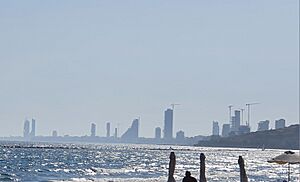
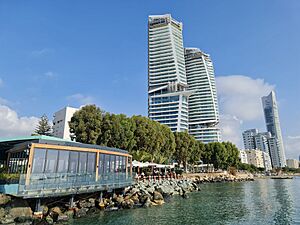
After the financial crisis in Cyprus, the city of Limassol saw a big increase in property development. This was largely due to Russian investors. Many Russians moved to Limassol, leading to the city sometimes being called "Limassolgrad." This growth was linked to a program that offered Cypriot citizenship in exchange for investment.
Relations with Russia (After 2022)
After Russia invaded Ukraine in 2022, Anastasiades' government changed its position towards Russia. Anastasiades condemned the invasion, saying it violated international law. He stated that Cyprus stood with Ukraine, comparing it to Cyprus's own history of invasion. Cyprus supported EU sanctions against Russia.
The Russian Foreign Minister said that Russia's "traditional friends Greece and Cyprus" were too quick to take a stance against his country. Anastasiades replied that Russia's actions forced Cyprus to follow the European Union's decisions.
The economy of Limassol was affected as Russian investors faced frozen bank accounts. Many Cypriot companies working with Russians closed down. The tourism sector, which relied on Russian visitors, also faced challenges. However, Limassol's economy showed strength, adapting to the changes.
The United States asked Anastasiades’ government to deal with the issue of Russian money in Cyprus. In return, the U.S. lifted its ban on arms sales to Cyprus. As a result, American military forces took part in joint exercises with the Cypriot National Guard.
Investigations later revealed some undisclosed connections between Cyprus and Russia that continued after the 2022 invasion. These investigations raised questions about Anastasiades' links to Russian businesspeople and meetings with Putin.
Relations with Saudi Arabia
On 3 January 2018, Anastasiades made the first official visit by a Cypriot President to Saudi Arabia. He was invited by King Salman. Both leaders agreed on the need to improve relations between the European Union and Gulf countries. They also stressed the importance of fighting extremism. Many agreements were signed, including one to avoid double taxation.
On 1 March 2022, Anastasiades met with Saudi Arabia's Crown Prince Mohammed bin Salman in Riyadh. They discussed strengthening cooperation in tourism, investment, and other areas. They also talked about global issues like the Russian invasion of Ukraine and the Cyprus problem. Both leaders wanted to make their relationship even stronger.
COVID-19 Pandemic
On 9 March 2020, Cyprus reported its first two cases of COVID-19. This led to panic, and Anastasiades’ government quickly put in place strict measures to stop the virus from spreading.
Lockdowns
The first full lockdown in Cyprus was from 24 March to 13 April 2020. This meant people could only leave their homes for essential reasons. They needed special forms or had to send an SMS to get approval for movement.
Later, in November 2020, a partial lockdown was put in place with a night-time curfew. Businesses like restaurants had limited hours, and gyms closed. These measures were made stricter in December, with more closures and a ban on Christmas church attendance.
A second full lockdown began on 10 January 2021, as cases continued to rise. Shops, hairdressers, and large department stores closed. People could only leave their homes twice a day for essential activities. Schools moved to distance learning.
Another partial lockdown was implemented from 26 April to 9 May 2021, during the Orthodox Easter holidays. This was due to a third wave of infections. It included encouraging remote work, closing non-essential shops, and a stricter curfew.
SafePass Implementation
On 10 May 2021, the government introduced the "SafePass." This meant people had to show proof of immunity (like a vaccination certificate or recent recovery from COVID-19) or a negative rapid test result to enter crowded places. The police were responsible for checking these.
The mandatory SafePass was removed on 15 May 2022, as the number of cases and hospitalizations dropped significantly.
Travel Restrictions
On 13 March 2020, Anastasiades announced a 15-day border closure starting 15 March. This was to stop the spread of the virus. Only Cypriots, Europeans working on the island, and those with special permits could enter.
Cyprus began to reopen its borders in phases from 9 June 2020. Countries were put into categories based on their COVID-19 situation. The government even offered to pay for travel costs for visitors who tested positive after arriving. However, tourism still dropped by 85% in 2020.
On 14 February 2021, Greece, Cyprus, and Israel agreed to allow free travel for citizens with COVID-19 vaccination certificates. This was seen as a step towards bringing back tourism. This agreement started on 1 April 2021.
On 1 June 2022, Anastasiades' government lifted all COVID-19 travel restrictions at ports and airports. Mask requirements in indoor spaces were also removed. This meant a return to normal travel, with passenger numbers getting close to what they were before the pandemic.
Testing and Vaccination
On 8 November 2020, the government launched a free rapid testing program for everyone. This helped to understand how much the virus was spreading. On 27 December 2020, Cyprus started its COVID-19 vaccination campaign, giving priority to older people.
In April 2021, Cyprus was ranked first in the EU for COVID-19 testing. It also had one of the lowest death rates.
From 1 August 2021, free rapid tests for unvaccinated people were stopped, with some exceptions for minors, those unable to be vaccinated, and pregnant women.
Addressing Prison Overcrowding
On 27 March 2020, Anastasiades announced the release of 50 prisoners to reduce overcrowding in Nicosia prison. This was to prevent the virus from spreading inside. Only non-violent prisoners were released. In total, 114 prisoners were released as part of these measures.
Stranded Cruise Ships
During the pandemic, Anastasiades' government allowed six cruise ships to anchor in Cypriot waters for several months. This helped Cyprus economically, as the country earned fees for hosting these vessels. This provided some relief during the difficult economic times caused by the lack of tourism.
Protests
On 7 March 2020, protesters tried to cross a police line at Nicosia's Ledra Street crossing. They were demanding its reopening. Authorities had closed some checkpoints due to COVID-19 concerns. The government said the closures were not political.
On 13 February 2021, there were clashes between police and protesters in Nicosia. Demonstrators were angry about government corruption and COVID-19 rules. Police used tear gas and water cannons, and several people were arrested.
On 18 July 2021, protesters against COVID-19 measures and vaccines attacked Sigma TV, a television station in Nicosia. This happened after a larger protest outside the presidential palace. The station was damaged, and a car was set on fire. President Anastasiades condemned the violence.
In November and December 2021, more protests took place, sparked by stricter COVID-19 rules in schools. Parents clashed with police in Limassol, blocking traffic.
Aftermath
Despite protests and criticism, Anastasiades' COVID-19 response was seen as a success. Cyprus ranked fifth globally in a COVID Performance Index of 98 nations. It was the highest-ranked European country. This success was due to early lockdowns and a good testing strategy.
The Cypriot economy showed strength during the pandemic. It grew by 5.6% in 2022, helped by the recovery of tourism. The government also reduced public debt and unemployment. In 2022, the country also introduced the national minimum wage.
Controversies
In November 2019, it was reported that a Malaysian figure, Jho Low, was given Cypriot citizenship under an investment program. This happened shortly after he invested in property in Cyprus. He was granted citizenship even though there were concerns about his background. The program allowed people to get citizenship by investing in the country.
Before becoming president, Anastasiades founded a law firm that worked with Russian clients. After he became president, he signed agreements with Russia to improve economic ties. During this time, Cyprus became a place where Russian businesspeople could register their assets.
In 2019, a report linked Anastasiades' law firm to business deals involving Russian figures. The report said the firm handled complex deals that moved Russian money. Anastasiades' daughters are still partners in the firm, and he still has an office there.
In 2021, his name was mentioned in the Pandora Papers, which are leaked documents about offshore financial dealings.
A journalist and writer, Makarios Drousiotis, published books about alleged corruption during Anastasiades' presidency. In 2024, one of his books led to a criminal investigation against Anastasiades. On 23 April 2024, Anastasiades filed a lawsuit against Drousiotis, seeking money for defamation and a ban on his books.
Personal and Family Life
Anastasiades married Andri Moustakoudes in 1971. They have two daughters, Elsa and Ino. His daughters are listed as owners of the law firm that Anastasiades founded.
He has a twin brother and a sister. In 2001, his twin brother, Pambos Anastasiades, was sentenced to 18 months in prison for his part in a work permit scandal.
Distinctions
- First Vice-president of the delegation of the House to the EU-Cyprus Joint Parliamentary Committee (JPC).
- Leader of the delegation of the House to the Asian Parliamentary Assembly (APA) since 2008.
- Leader of the delegation of the House to the Parliamentary Assembly of the Mediterranean (PAM).
- Leader of the delegation of the House to the Parliamentary Assembly of the Union for the Mediterranean since 2010.
- Vice-president of the executive committee of the Cyprus Group to the Inter-Parliamentary Union (IPU).
- Member of the delegation of the House to the Parliamentary Assembly of the Union for the Mediterranean and of the delegation of the House to the Asian Parliamentary Assembly (APA).
Honours and Awards
- Greek Orthodox Patriarchate of Jerusalem: Knight Grand Cross of the Order of the Orthodox Crusaders of the Holy Sepulchre (7 May 2013)
 Panama: Collar of the Order of Manuel Amador Guerrero (23 July 2013)
Panama: Collar of the Order of Manuel Amador Guerrero (23 July 2013) Bahrain: Order of Sheikh Isa bin Salman Al Khalifa (9 March 2015)
Bahrain: Order of Sheikh Isa bin Salman Al Khalifa (9 March 2015) Greece: Grand Collar of the Order of the Redeemer (30 March 2015)
Greece: Grand Collar of the Order of the Redeemer (30 March 2015) Egypt: Grand Collar of the Order of the Nile (20 November 2017)
Egypt: Grand Collar of the Order of the Nile (20 November 2017)- Greek Orthodox Patriarchate of Alexandria: Knight Grand Cross of the Order of Saint Mark (1 May 2018)
 Serbia: Grand Cross of the Order of the Republic of Serbia (10 May 2018)
Serbia: Grand Cross of the Order of the Republic of Serbia (10 May 2018)- Serbian Orthodox Church: Order of St. Sava (10 May 2018)
 Slovenia: Order for Exceptional Merits (9 January 2019)
Slovenia: Order for Exceptional Merits (9 January 2019) Poland: Grand Cross of the Order of the White Eagle (4 October 2021)
Poland: Grand Cross of the Order of the White Eagle (4 October 2021) Georgia: Order of the Golden Fleece (9 November 2021)
Georgia: Order of the Golden Fleece (9 November 2021) Jordan: Grand Cordon of the Supreme Order of the Renaissance (17 December 2021)
Jordan: Grand Cordon of the Supreme Order of the Renaissance (17 December 2021) Holy See: Grand Collar of the Order of Pope Pius IX (25 October 2022)
Holy See: Grand Collar of the Order of Pope Pius IX (25 October 2022) Israel: President's Medal (10 November 2022)
Israel: President's Medal (10 November 2022)
See also
 In Spanish: Níkos Anastasiádis para niños
In Spanish: Níkos Anastasiádis para niños
- European People's Party
- Reduction of military conscription in Cyprus
 | William L. Dawson |
 | W. E. B. Du Bois |
 | Harry Belafonte |


